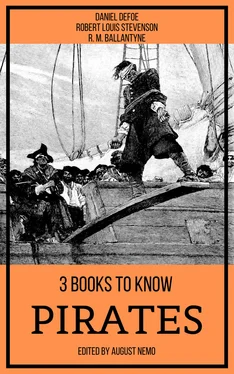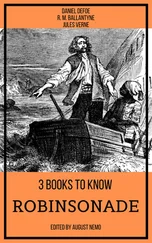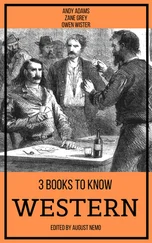By this time the natives outside were all astir, and breakfast in an advanced state of preparation. During the course of it we made sundry attempts to converse with the natives by signs, but without effect. At last we hit upon a plan of discovering their names. Jack pointed to his breast and said “Jack” very distinctly; then he pointed to Peterkin and to me, repeating our names at the same time. Then he pointed to himself again and said “Jack,” and laying his finger on the breast of the chief, looked inquiringly into his face. The chief instantly understood him, and said “Tararo” twice distinctly. Jack repeated it after him, and the chief, nodding his head approvingly, said “Chuck,” on hearing which Peterkin exploded with laughter. But Jack turned, and with a frown rebuked him, saying, “I must look even more indignantly at you than I feel, Peterkin, you rascal, for these fellows don’t like to be laughed at.” Then turning towards the youngest of the women, who was seated at the door of the bower, he pointed to her; whereupon the chief said “Avatea,” and pointing towards the sun, raised his finger slowly towards the zenith, where it remained steadily for a minute or two.
“What can that mean, I wonder?” said Jack, looking puzzled.
“Perhaps,” said Peterkin, “the chief means she is an angel come down to stay here for a while. If so, she’s an uncommonly black one!”
We did not feel quite satisfied with this explanation, so Jack went up to her and said “Avatea.” The woman smiled sadly and nodded her head, at the same time pointing to her breast and then to the sun in the same manner as the chief had done. We were much puzzled to know what this could signify; but as there was no way of solving our difficulty, we were obliged to rest content.
Jack now made signs to the natives to follow him, and taking up his axe, he led them to the place where the battle had been fought. Here we found the prisoners, who had passed the night on the beach, having been totally forgotten by us, as our minds had been full of our guests, and were ultimately overcome by sleep. They did not seem the worse for their exposure, however, as we judged by the hearty appetite with which they devoured the breakfast that was soon after given to them. Jack then began to dig a hole in the sand, and after working a few seconds, he pointed to it and to the dead bodies that lay exposed on the beach. The natives immediately perceived what he wanted, and running for their paddles, dug a hole in the course of half-an-hour that was quite large enough to contain all the bodies of the slain. When it was finished, they tossed their dead enemies into it with so much indifference that we felt assured they would not have put themselves to this trouble had we not asked them to do so. The body of the yellow-haired chief was the last thrown in. This wretched man would have recovered from the blow with which Jack felled him, and indeed he did endeavour to rise during the melee that followed his fall; but one of his enemies, happening to notice the action, dealt him a blow with his club that killed him on the spot.
While they were about to throw the sand over this chief, one of the savages stooped over him, and with a knife, made apparently of stone, cut a large slice of flesh from his thigh. We knew at once that he intended to make use of this for food, and could not repress a cry of horror and disgust.
“Come, come, you blackguard!” cried Jack, starting up and seizing the man by the arm, “pitch that into the hole. Do you hear?”
The savage, of course, did not understand the command; but he perfectly understood the look of disgust with which Jack regarded the flesh, and his fierce gaze as he pointed towards the hole. Nevertheless, he did not obey. Jack instantly turned to Tararo and made signs to him to enforce obedience. The chief seemed to understand the appeal; for he stepped forward, raised his club, and was on the point of dashing out the brains of his offending subject when Jack sprang forward and caught his uplifted arm.
“Stop, you blockhead!” he shouted. “I don’t want you to kill the man!” He then pointed again to the flesh and to the hole. The chief uttered a few words, which had the desired effect; for the man threw the flesh into the hole, which was immediately filled up. This man was of a morose, sulky disposition, and during all the time he remained on the island, regarded us — especially Jack — with a scowling visage. His name, we found, was Mahine.
The next three or four days were spent by the savages in mending their canoe, which had been damaged by the violent shock it had sustained on striking the shore. This canoe was a very curious structure. It was about thirty feet long, and had a high, towering stern. The timbers of which it was partly composed were fastened much in the same way as those of our little boat were put together; but the part that seemed most curious to us was a sort of outrigger, or long plank, which was attached to the body of the canoe by means of two stout cross-beams. These beams kept the plank parallel with the canoe, but not in contact with it, for it floated in the water with an open space between — thus forming a sort of double canoe. This, we found, was intended to prevent the upsetting of the canoe, which was so narrow that it could not have maintained an upright position without the outrigger. We could not help wondering both at the ingenuity and the clumsiness of this contrivance.
When the canoe was ready, we assisted the natives to carry the prisoners into it, and helped them to load it with provisions and fruit. Peterkin also went to the plum-tree for the purpose of making a special onslaught upon the hogs, and killed no less than six of them. These we baked and presented to our friends, on the day of their departure. On that day Tararo made a great many energetic signs to us, which, after much consideration, we came to understand were proposals that we should go away with him to his island; but having no desire to do so, we shook our heads very decidedly. However, we consoled him by presenting him with our rusty axe, which we thought we could spare, having the excellent one which had been so providentially washed ashore to us the day we were wrecked. We also gave him a piece of wood with our names carved on it, and a piece of string to hang it round his neck as an ornament.
In a few minutes more we were all assembled on the beach. Being unable to speak to the savages, we went through the ceremony of shaking hands, and expected they would depart; but before doing so, Tararo went up to Jack and rubbed noses with him, after which he did the same with Peterkin and me! Seeing that this was their mode of salutation, we determined to conform to their custom; so we rubbed noses heartily with the whole party, women and all! The only disagreeable part of the process was when we came to rub noses with Mahine; and Peterkin afterwards said that when he saw his wolfish eyes glaring so close to his face, he felt much more inclined to bang than to rub his nose. Avatea was the last to take leave of us, and we experienced a feeling of real sorrow when she approached to bid us farewell. Besides her modest air and gentle manners, she was the only one of the party who exhibited the smallest sign of regret at parting from us. Going up to Jack, she put out her flat little nose to be rubbed, and thereafter paid the same compliment to Peterkin and me.
An hour later the canoe was out of sight; and we, with an indefinable feeling of sadness creeping round our hearts, were seated in silence beneath the shadow of our bower, meditating on the wonderful events of the last few days.
Читать дальше













